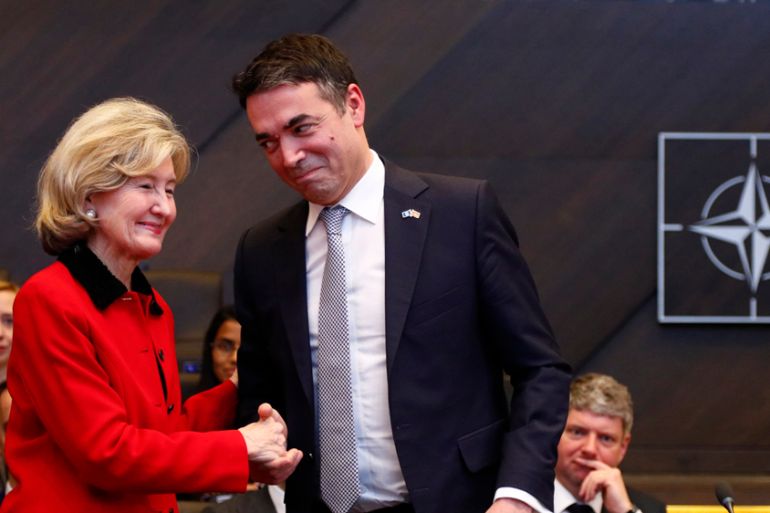North Macedonia signs accord to join NATO amid Russian concerns
Russia accuses the West of ‘destabilising’ the Balkans by pushing Macedonia and Montenegro to join NATO.

NATO members signed an accord with Macedonia on Wednesday allowing the tiny former Yugoslav republic to become the 30th member of the US-led alliance after a deal with Greece ended a 27-year-old dispute over its name.
Macedonian Prime Minister Zoran Zaev said it was a “great, historic day for all our citizens”.
Keep reading
list of 4 itemsNATO allies must do more as Ukraine runs out of ammunition: Stoltenberg
Nordic tensions on the rise amid Russian anger over NATO accessions
Flag of NATO’s 32nd member, Sweden, raised at alliance’s headquarters
“Today, the largest security alliance in the world, NATO, has welcomed us,” he wrote on social media. “We have provided lasting stability for our country.”
The ratification process typically takes about a year, and the United States has said it expects Macedonia – now known officially as North Macedonia under the terms of its name deal with Greece – to formally join the alliance in 2020.
‘Door remains open’
NATO Secretary-General Jens Stoltenberg said the admittance of a new member highlighted that all European nations who met the entrance criteria could join the regional alliance, a position Moscow rejects.
“It shows that NATO’s door remains open for countries that meet NATO standards and that adhere to the NATO values of democracy, the rule of law and individual liberty,” Stoltenberg said.
Russian President Vladimir Putin last month accused the West of “destabilising” the Balkans by pushing Macedonia and Montenegro to join NATO.
|
|
For many countries once in the Soviet orbit, NATO membership, with its guarantee of mutual defence, provides a welcome insurance policy against possible Russian incursions.
‘World more peaceful’
Foreign Minister Nikola Dimitrov said Macedonia’s decision would improve regional stability, echoing the view of Western countries that see NATO and EU membership as the best way of preserving peace in the Balkans after the violent breakup of Yugoslavia in the 1990s.
“For us, NATO is about making the world more peaceful, more stable,” he said.
Three other former Yugoslav republics – Slovenia, Croatia and Montenegro – have already joined NATO, as have other countries in the Balkan region including Albania, Bulgaria and Romania.
Both Greek and Macedonian parliaments have agreed to rename the country the Republic of North Macedonia, ending Athens’s years-long veto of its neighbour’s efforts to join NATO and the EU. Greece sees the use of “Macedonia” as implying territorial claims to a Greek province of the same name.
Putin has also warned NATO against cultivating closer ties with Ukraine and Georgia, two ex-Soviet republics that also aspire to join the North Atlantic Treaty Organisation, which is headquartered in Brussels.
After the Macedonia signing protocol, Stoltenberg praised Georgia on Wednesday, saying: “We are very encouraged by what we see in Georgia, their commitment to reforms, their commitment to strengthening defence and security institutions, their commitment to transparency, judiciary reforms.”